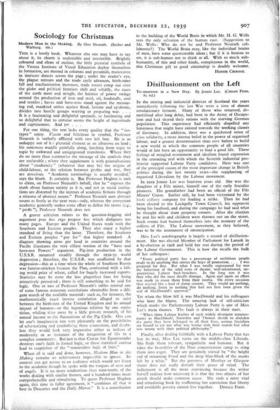Disillusionment on the Left
IN the mining and industrial districts of Scotland the years immediately following the last War were a time of almost revolutionary ferment. Many of those who returned, de- mobilised after long delay, had been in the Army of Occupa- tion and had shared their rations with the starving German
population. This experience had efficiently dispelled any bitterness that might have existed towards the working classes of Germany. In addition, there was a quickened sense of class solidarity, a more intense belief in the power of organised labour, and a greater determination than ever before to build a new world in which the common people of all countries would at last have an opportunity to lead a good life. These feelings of mingled resentment and idealism found expression in the crusading zeal with which the Scottish industrial pro- letariat supported Labour Party candidates. Here was one of the principal causes of the most important change in British politics during the last twenty years—the supplanting of organised Liberalism by the Labour movement.
In 1919 Jennie Lee was fourteen years old. She was the daughter of a Fife miner, himself one of the early Socialist
pioneers. His grandfather had been an official of the Fife Miners' Union. Earlier still, he had been victimised by the load colliery company for leading a strike. Then he had been elected to the Lochgelly Town Council, his opponent being his landlord, and during the campaign he had said what he thought about slum property owners. After the election he and his wife and children were thrown out on the street. Such events had burned themselves into the memory of the colliers of Fife. The Labour movement, as they believed, was to be the instrument of emancipation.
Miss Lee's autobiography is largely a record of disillusion- ment. She was elected Member of Parliament for Lanark in a by-election in 1928 and held her seat during the period of the Labour Government. This is how she recalls the bulk of her colleagues:
"Every political party has a percentage of ambitious people ready to do anything that carries the hope of promotion. ... I was prepared for that. But what I was totally unprepared for was the behaviour of the solid rows of decent, well-intentioned, un- pretentious Labour back-benchers. In the long run it was they who did the most deadly damage. Again and again an effort was made to rouse them from their inertia. On every occasion they reacted like a load of damp cement. They would see nothing, do nothing, listen to nothing that had not first been given the seal of MacDonald's approval."
Yet when the blow fell it was MacDonald and his colleagues who bore the blame. The amazing lack of self-criticism which marks the Parliamentary Labour Party is one of Miss Lee's main themes. The fault is always in their stars.
" When three Labour leaders of such widely divergent tempera- ments as MacDonald, Snowden and Thomas decide to abandon the party they have belonged to all their lives, serious Socialists are bound to ask not what was wrong with their morals but what was wrong with their political philosophy."
Finally, after dealing faithfully with a Labour Party that has lost its way, Miss Lee turns on the middle-class Liberals. She finds them tolerant, sympathetic and humane. But it takes the brutalities of the Nazi concentration camp to sting them into anger. They are genuinely stirred by " the bright red of streaming blood and the deep blue-black of the marks left by a whip." But the greyness of Merthyr or Glasgow slums does not really disturb their peace of mind. The indictment is all the more convincing because the writer herself realises how necessary it is that the two objects of her attack should make common cause. She ends a most vital and stimulating book by reaffirming her conviction that liberty
and avoidable poverty cannot live together. DINGLE Foot




































 Previous page
Previous page